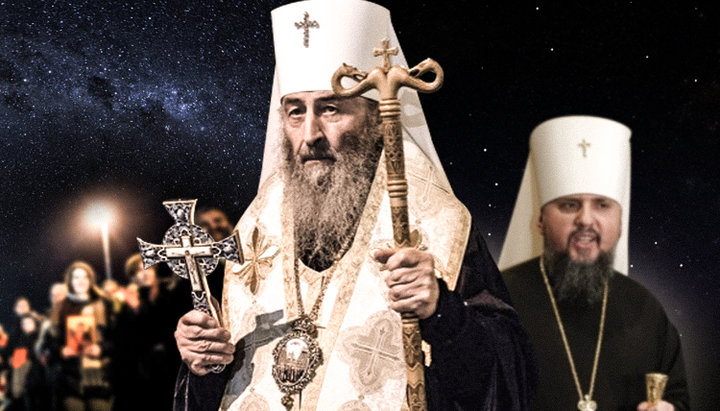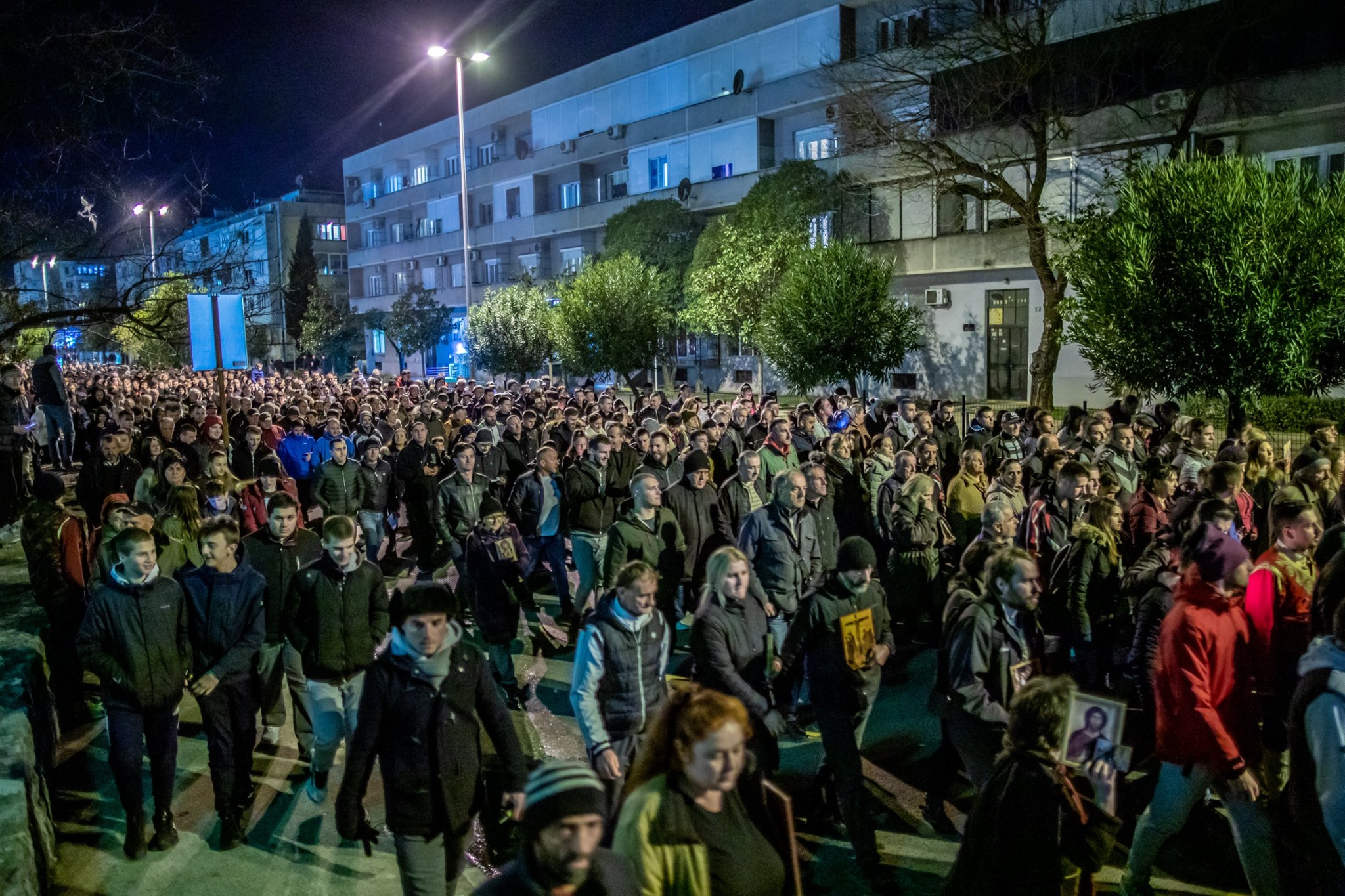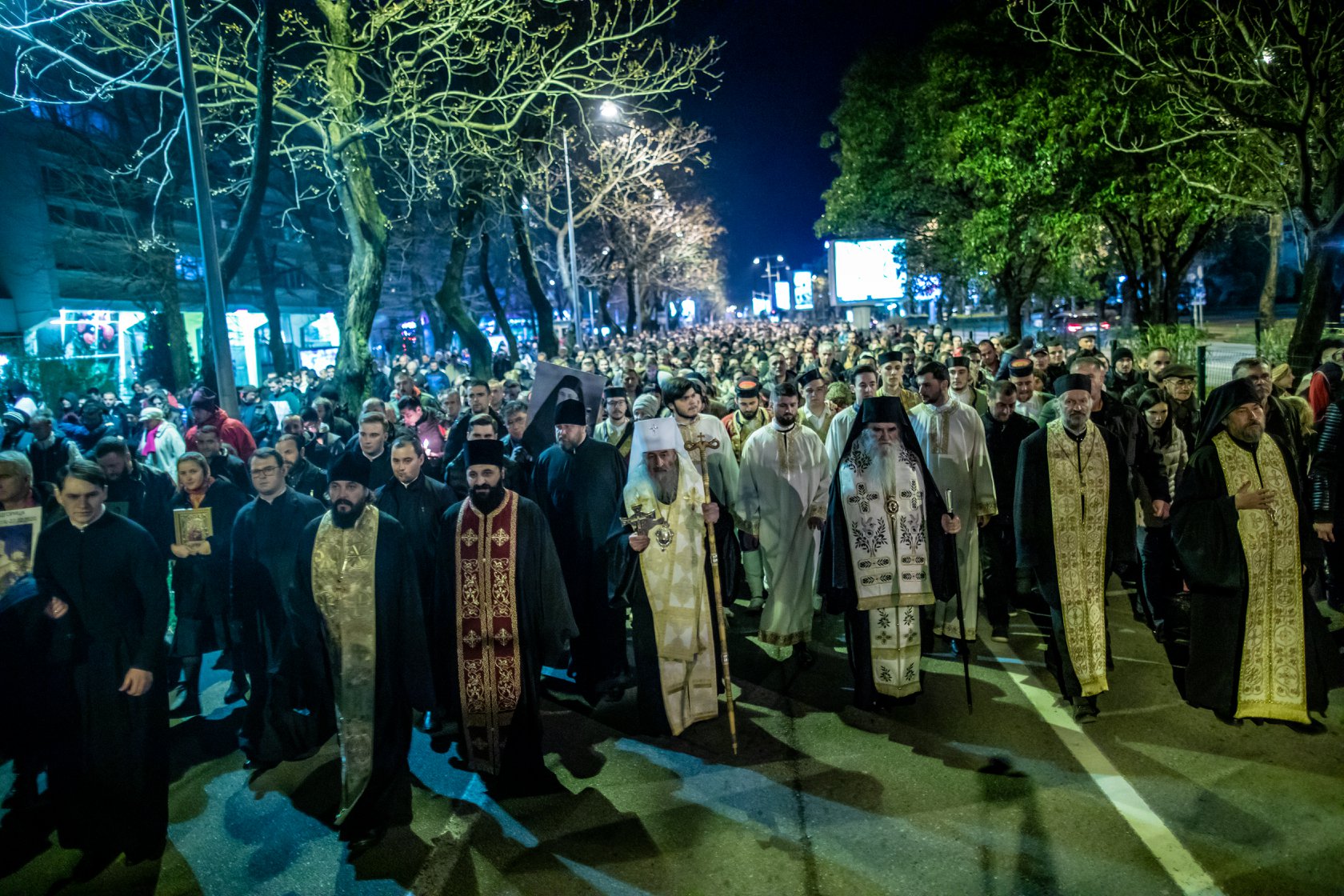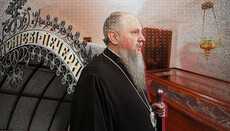Montenegro and Metropolitan of Kiev: the truth against politics

On February 27, the Ukrainian Embassy to Montenegro posted a provocation against UOC Primate. What is behind this statement and what is common between the two countries?
At the end of February 2020, Montenegro became the center of attention for Orthodox Ukraine. Initially, Sergei (Epiphany) Dumenko complained that he was not seen as the Metropolitan of Kiev in Montenegro. Instead, His Beatitude Onuphry was invited as such. Then a scandalous and completely absurd statement was made by the Embassy of Ukraine to Montenegro, stating that Metropolitan Onuphry was only “the Metropolitan of the Russian Orthodox Church in Kiev and as a high-ranking church official of the Russian Orthodox Church, he is not authorized to express the opinion of the majority of Orthodox believers in Ukraine or the Orthodox Church of Ukraine. ”
Finally, on February 27, His Beatitude went on a visit to Montenegro, everyone could see for themselves who they consider Metropolitan of Kiev there. Tens of thousands of Montenegrins at the cross procession led by His Beatitude Onuphry, overcrowded churches, unequivocal statements of support, awards from the head of the Montenegrin-Littoral Metropolis, all this clearly says that in Montenegro they consider only Metropolitan Onuphry as the canonical primate.
The only question remains – what was it from the side of Ukrainian diplomats? And how to regard their act?
Time of deeds

Tens of thousands of ordinary people go out into the streets of a small European country located almost in the very centre of Europe twice a week for several months. They come out in order to protect their Church from the arbitrariness of local authorities and government officials. Someone regards this as a rebellion against the authorities, others – as protests and civil disobedience or an attempt to reason with the presumptuous “people's representatives”. But everyone agrees that these people do not clench fists but make a sign of the cross, and their hands are holding not bricks or Molotov cocktails but crosses and icons. And the words that they say during their meetings are not curses and calls for the overthrow of the authorities but church chants and calls for fasting and prayer. It's about Montenegro.
Today, ordinary believers in this country demonstrate to the whole world an example of courage and a true, Christian approach to solving problems. Their faith is astounding. Indeed, you must agree that to regularly go out after work in the streets of your cities just to support the Church is a step worthy of respect. If the Church gathered a certain number of people once or twice, then it would be possible to say that there is nothing particularly surprising in this. But, in Montenegro, almost a bigger part of ... the country is gathered daily! Is this not the voice of the people? And it is very strange that politicians do not want to listen to him. What is going on there? Why do people think that the time has come for deeds and the Church needs to be protected?
Three causes for the persecution of the Church in Montenegro
The fact is that the country's parliament adopted the law “On Freedom of Conscience and Religious Organizations”, one of the clauses of which provides for the return to the ownership of the state of objects and lands of religious communities if they did not belong to these communities before December 1, 1918. In accordance with this law, the state will oblige religious communities to document their rights to own property. At the same time, everyone perfectly understands that there was no legal (documented) registration of church property objects a hundred years ago as unnecessary.
This means that the vast majority of churches, monasteries, as well as other real estates (including land) owned by the Church today, will go to the state. We are talking about 650 churches and monasteries that are under the jurisdiction of the Serbian Orthodox Church in Montenegro, including the famous Ostrog Monastery.
That is why, analysts and simply informed people say that the government, adopting this law, wants, firstly, to weaken the Serbian Orthodox Church as much as possible, and secondly, hiding behind patriotic slogans, to create its own pocket “church” structure (in Montenegro, there is the marginal and non-recognized Montenegrin Orthodox Church), which will fulfill the wishes of the country's leadership.
In addition, there is also a third reason – the economic one. For example, the Montenegro-Littoral Metropolis owns 100 hectares of beach in Buljarica Bay, which the President of Montenegro Milo Đukanović wants to take away and transfer to private investors. If this is true, then it turns out that would-be patriotism does not always speak of care and support for his country, and Samuel Johnson was right when he said: "Patriotism is the last refuge of a villain."
Ukraine and Montenegro: parallels
Regarding popular patriotism, there are a lot of parallels between the events in Montenegro and Ukraine.
The current president of this country, Milo Đukanović, like the former President of Ukraine Petro Poroshenko, is a supporter of Montenegro's European integration. In addition, he is a fierce opponent of neighbouring Serbia, and believes that Montenegro and this country should have nothing in common – not only politically but also culturally and religiously.
In the early 2000s, Đukanović, who was a functionary of the Communist Party of Yugoslavia in his youth (sounds familiar?), took a course towards demarcation with Serbia, and already in 2006 achieved Montenegro’s candidate status for joining the European Union. In 2016, the country signed an agreement with NATO.
It is clear that being like-minded in relation to the development of their states, both Đukanović and Poroshenko could not disregard the “church issue”. At the same time, their rhetoric is so similar that you can calmly ascribe the words of one president to the statements of another, with the toponym “Russia” changed for “Serbia”.
For example, according to Đukanović, the Montenegrin-Littoral Metropolis, which is part of the Serbian Orthodox Church and unites the overwhelming majority of the people of Montenegro, is the “long arm of Serbia”, the “Kremlin’s agent of influence” and the preacher of the “Serbian world”.
Here are the words of the same Đukanović (under which, with toponymic amendments, Poroshenko can also sign): “The Serbian Orthodox Church is one of the important tools used by the ideologists of “the Great Serbian nationalism” against Montenegro, against its independence, national, cultural and religious identity”.
Or this statement: “Montenegro should have its own Church as a way to assert its national identity 14 years after independence.” Compare it with the words of Poroshenko: "The Tomos for us is actually another act of declaring the independence of Ukraine." As they say, no comment.
That is why the believers of Montenegro are sure the government of the country in the "church issue" decided to follow in the footsteps of Ukraine.
In one of his interviews, Bishop Joanikije (Mićović) of Budimlja and Nikšić noted: “This is very similar to the Ukrainian scenario. It seems to me that they took a lot from the Ukrainian model. In fact, it goes about sowing discord between Orthodox people, imposed divisions, hatred, and this is very dangerous. This leads to general instability, which may be beneficial for the authorities because it is easier to manage the situation and avoid other pressing problems.”
This means that the authorities will support the so-called “Montenegrin Orthodox Church” and lobby not only its interests inside the country but also abroad. In particular, we are talking about granting the Montenegrin schismatics a legitimate status by obtaining the same Tomos from the hands of the Patriarch of Constantinople.
At present, this schismatic structure does not have a significant influence in the religious field of Montenegro – it has one church at its disposal, about a dozen clergy and several hundred believers. However, as in the case of the Kiev Patriarchate, this religious organization, with the well-known support of the authorities, can become a platform for the creation of the next “puppet Сhurch” of the Phanar. Moreover, it was the Montenegrin Church that recognized the UOC-KP one of the first.
Ukrainian politics and the Church
Against this background, all the statements of the Montenegrin government that, as they say, it will not interfere in the internal affairs of the Church but will act exclusively within the framework of the Constitution, look, to put it mildly, hypocritical. We remember that the same words were once said by the former president of Ukraine Petro Poroshenko. For example, immediately after receiving the Tomos, he said: “As president I guarantee on behalf of the state that Ukraine will respect the religion of every citizen.” But, as we all know perfectly well, speaking doesn’t mean doing.
Moreover, the officials, “brought up in the right way” under Poroshenko regarding the canonical Church, still continue to actively intervene not only in the internal affairs of the UOC but also in the internal affairs of other Local Churches, in particular the Serbian Orthodox Church.
In connection with the visit of His Beatitude Metropolitan Onuphry to Montenegro, the Embassy of Ukraine to this country published a statement in which it called the Primate of the UOC “Metropolitan of the Russian Orthodox Church in Kiev, Bishop Onuphry” and stated that “Metropolitan Onuphry as a high-ranking official of the Russian Orthodox Church is not authorized to express the opinion of the majority of Orthodox believers in Ukraine or the Orthodox Church of Ukraine”. Embassy officials cited a statement of the OCU press service, which says that "the only canonical Primate of the Ukrainian Church is Epiphany Dumenko". You must admit that it’s rather strange to observe how the servants of the secular state, which Ukraine positions itself in Europe, determine the canonicity of this or that Church and decide who has the right to speak on behalf of believers!
As the blogger Alexander Voznesensky rightly remarks, the Embassy of Ukraine to Montenegro “contrary to the Constitution of Ukraine, not only interferes in church affairs but also intervenes in the religious affairs of another country, trying to incite religious hatred and publicly declaring support for schismatics in Montenegro, disseminating texts against the Serbian Orthodox Church and the Ukrainian Orthodox Church”. We also note that in this case there is also discrimination on the religious ground. Can we imagine such a statement regarding, for example, the head of the UGCC Sviatoslav Shevchuk, to say that he is "a high-ranking official of the Roman Catholic Church and has no right to speak on behalf of Ukrainian believers of the UGCC"? No. Why then is this possible with respect to the UOC? The answer is simple – because the previous government wanted so. But now everything should be according to the law, right? And embassy officials are well aware of this.
Strange as it may seem, the case of the Embassy of Ukraine in Montenegro was continued by their colleagues from the Embassy of Ukraine in Serbia, who decided to instruct the Serbian media with a few modified quotes from that very statement of the OCU press service, which says about the Tomos and recognition by the Phanar. In addition, the statement said that in accordance with the studies of the Razumkov Centre, the support of the UOC among the believing population of Ukraine is declining, and the UOC itself is called the “Russian Orthodox Church in Ukraine”.
The UOC DECR has already responded to these provocations, calling on the state to hold officials accountable for inciting religious hatred. His Beatitude said that after the celebrations he would deal with this situation, too.
People with their Church vs. politicians with theirs

Anyway, now it is quite obvious that both Ukrainian and Montenegrin authorities stubbornly continue ignoring what their peoples want and, pursuing momentary political interests, take the side of the enemies of the Church.
Another thing is also clear that schismatics in Ukraine and Montenegro bet on the government’s support rather than people’s. That is why Epiphanius Dumenko meets with ambassadors and diplomats of foreign states almost every week, and a few weeks ago even gathered them at his residence. The OCU is a political project from the beginning to the end and resembles the Church only externally.
As for the people ... We saw how on February 27, following the Council of Primates in Amman, His Beatitude Metropolitan Onuphry of Kiev and All Ukraine arrived in Montenegro on an official visit. We saw the faithful of the Serbian Orthodox Church, who make up the majority of the population of Montenegro, meeting him in Podgorica. He came there not with political slogans but with the preaching of the Gospel, and thousands of Orthodox Christians of the country were eager to hear his word.
We don’t know if there is any analogue in Montenegro to the Razumkov Centre engaged in sociological study. We only know that no research can replace what our eyes saw. And they saw that the people of Montenegro, the Church in Montenegro, know exactly who represents the Ukrainian Orthodox Church and the Ukrainian Orthodox people. Believing Montenegrins, like believing Serbs and Ukrainians need no explanations: they themselves are well aware of the situation. And they express their opinion not in words but in deeds – a joint prayer in the church, confession, the Communion of Christ's Mysteries, participation in cross processions. Remember how many Orthodox Ukrainians participate in the annual Great Cross Procession? Hundreds of thousands. And how many Ukrainians make a three hundred-kilometer pilgrimage to the Pochaev Lavra from Kamenets? Tens of thousands. Joasaphat's Valley? Anne’s Mountain? Thousands and thousands! This is the best “study” of who the people are with and what they support. Just as in Montenegro. Only in the streets of Podgorica, there are 60,000 people (while the entire population of the city is 180,000 people).
What does all this mean? That the strength of the Church is not political support and diplomatic intrigues. The strength of the Church is in Christ. Governments, authorities, and states – all of them are temporary and sooner or later disappear. And the Church, according to the word of Christ, will remain until the end of time. It is impossible to replace it with anything, and grace cannot be imitated. Because the heart of a common believer will instantly distinguish where the Church is, where Christ is, where the Truth is and where politics, lies, and Beliar are.











